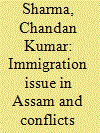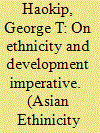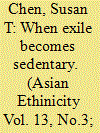|
|
|
Sort Order |
|
|
|
Items / Page
|
|
|
|
|
|
|
| Srl | Item |
| 1 |
ID:
112765


|
|
|
|
|
| Publication |
2012.
|
| Summary/Abstract |
Assam, the northeastern state of India, has experienced strong anti-outsider sentiment for more than half a century now. What makes the Assam case unique is that it has faced both internal as well as illegal international migration in massive scales giving rise to intense existential fear and apprehension among its smaller indigenous communities. Their lack of the required political authority and the indifferent attitude of the Indian Union government in addressing the issue have only multiplied its magnitude. The article explicates the politico-economic dynamics of the immigration issue in Assam and the social tension and conflicts around it in a historical perspective and suggests that a multi-pronged approach backed by strong political will is imperative to negotiate the challenges of immigration in the state in an effective manner.
|
|
|
|
|
|
|
|
|
|
|
|
|
|
|
|
| 2 |
ID:
112762


|
|
|
|
|
| Publication |
2012.
|
| Summary/Abstract |
Economic restructuring in the 1980s opened the doors to the previously state-dominated television sector in developing countries. In India, unexpectedly, the resulting competitive setting produced multiple channels targeting various local ethnicities from below along with national-level expansion involving transnational corporations from above in a process now known as localization. While the plurality of channels translates into growth of the public sphere, this paper examines the reasons behind the uneven growth of community media, which cannot be explained by the community's size or economic resources. Some community channels extend their reach into the national arena while others lag in media development implying unequal political participation in the communicative system. What are the institutional reasons behind such variations in a multiethnic setting? The paper also examines whether the development of ethnic media reflects the redistribution of power taking place in the political arena or is it an independent development with implications of its own.
|
|
|
|
|
|
|
|
|
|
|
|
|
|
|
|
| 3 |
ID:
112761


|
|
|
|
|
| Publication |
2012.
|
| Summary/Abstract |
'North East India' composed of different ethnicity is plagued with ethnic assertions and regionalism with that of centuries of alienation. Development is one big issue that need to be address in the region. The North East India after decades of independence is still lagging behind in term of socio, economic, education, political, cultural and social development. A deeper study reveals that movement for separate homeland, regionalism, tribalism, ethnic clash, crime, mass poverty, etc in the region are caused by backwardness of the region. The distinct geo-ethnic and socio-historical characters of North-East India constitute the hotbed of ethnic strife and extreme radicalism. The solution lies partly in resolving the conflict between primordial ethnic loyalties or 'ethno-nationalism' and the 'nationalism of the nation state', and partly a conscious and voluntary effort to resist corruption and unholy alliance between the militants and the politicians in the region. In any case, ethnic reconciliation would result in the reduction of ethnic violence of all kinds and would eventually restore law and order in the region. When the civil governance in the region will be spared from combating militancy or appeasing the militants, the whole energy of the government would be for strengthening the institutions of local self-government, which act as potential agents of development in the conflict-ridden states of the North-East India.
|
|
|
|
|
|
|
|
|
|
|
|
|
|
|
|
| 4 |
ID:
112763


|
|
|
|
|
| Publication |
2012.
|
| Summary/Abstract |
Educating South Asians with different language and cultural backgrounds and integrating them into mainstream society have been a challenge for the educational system of Hong Kong. This study documents the educational experiences of a group of Pakistani girls in the contexts of home, community, and school in Hong Kong. Using ethnographic methods, data collection is based on interviews evoking their life stories. These stories recount how Pakistani girls attempt to negotiate with traditional customs, religion and mainstream stereotypes and to construct racialized and gendered schooling experiences. This study highlights the importance of mainstream engagement in regard to critical learning about cultural and linguistic diversity. It is claimed that minorities have an active role as agents in social transformation and change in achieving racial and gender equality, in this case for the most disadvantaged minority females, within the asymmetrical power relationships between local Chinese and South Asian minorities in Hong Kong.
|
|
|
|
|
|
|
|
|
|
|
|
|
|
|
|
| 5 |
ID:
112764


|
|
|
|
|
| Publication |
2012.
|
| Summary/Abstract |
Waltraud Kokot and her coauthors stated ' … . despite a necessary focus on transnational networks and movement, ethnographic studies of diaspora must also not neglect the realities of sedentary diasporic life.' Taking such a call as my point of departure, this article explores the quotidian experiences of 'in exile' specific to a subgroup of Tibetans in Dharamsala, north India, who have for a couple of decades at least described themselves as the 'India-born'. Secondly, it particularly attends to the sensory domains of these Tibetans' local/Indian experiences and in turn highlights the geo-affinity that they ambivalently feel for the place where they are at once native and exilic. Demonstrated in the article are the ongoing processes through which individuals, feeling marked by the displacement of the nation to which they belong, realize their Tibetan attributes in the context(s) they in varied ways perceive as 'Indian'.
|
|
|
|
|
|
|
|
|
|
|
|
|
|
|
|
|
|
|
|
|